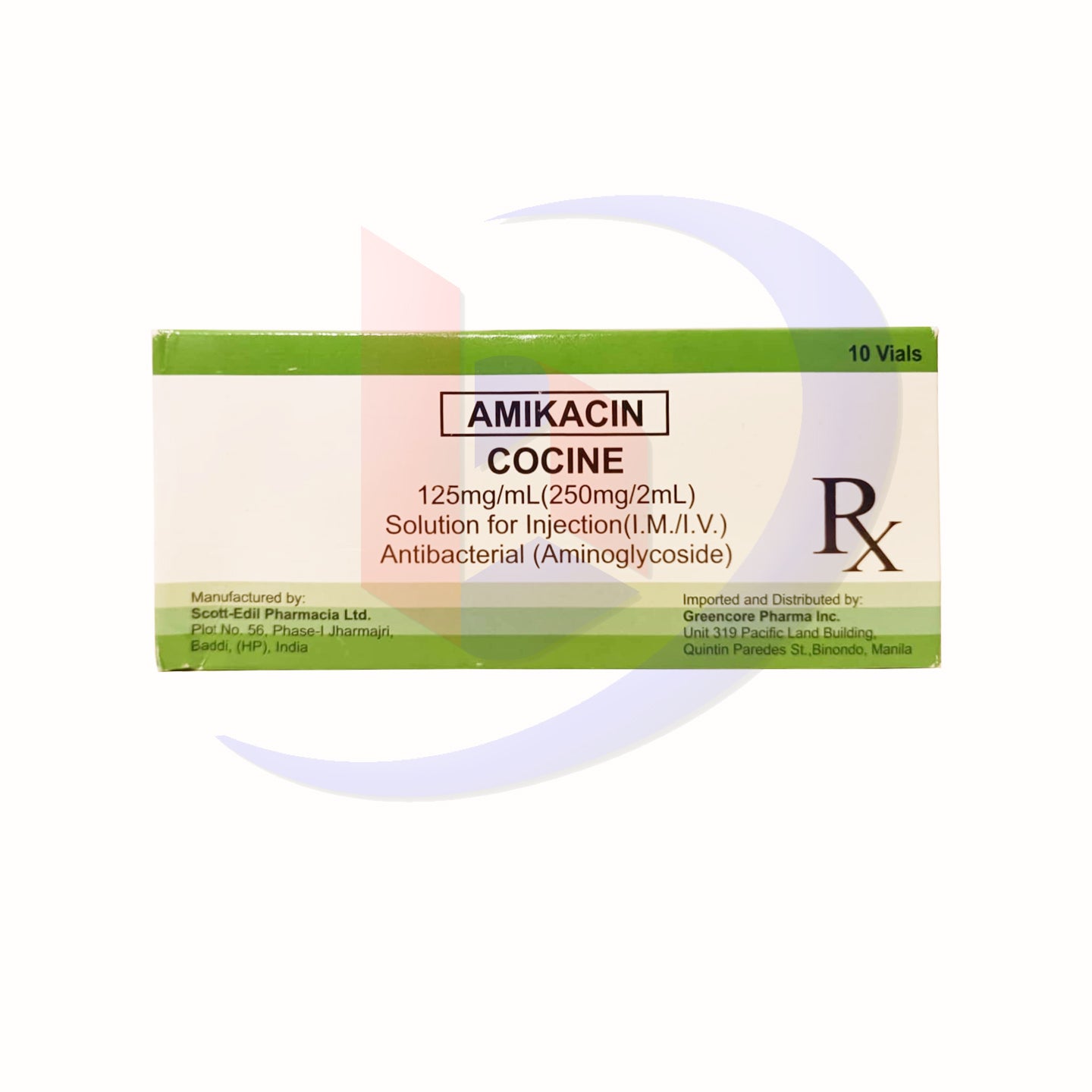Bambang Pharmaceutical Depot Inc.
Amikacin (Cocine) 125mg/ml (250mg/2ml) Solution for Injection (I.M / I.V) Vial 1's
Amikacin (Cocine) 125mg/ml (250mg/2ml) Solution for Injection (I.M / I.V) Vial 1's
Couldn't load pickup availability
Certainly! Here’s the detailed product information for Amikacin (Cocine) 125mg/ml (250mg/2ml) Solution for Injection (IM/IV) Vial 1's:
Product Description:
Amikacin (Cocine) is a broad-spectrum aminoglycoside antibiotic used to treat serious bacterial infections caused by susceptible microorganisms. It is available as a 125mg/ml solution for injection in a vial containing 250mg/2ml. The formulation is designed for intramuscular (IM) or intravenous (IV) administration.
Amikacin works by inhibiting bacterial protein synthesis, leading to bacterial cell death. It is typically used when infections are caused by gram-negative bacteria, as well as some gram-positive bacteria. The drug is especially useful when other antibiotics are ineffective or inappropriate.
Indications:
Amikacin (Cocine) is used to treat severe bacterial infections in various parts of the body. The drug is indicated for:
-
Complicated Urinary Tract Infections (UTIs):
-
Caused by susceptible gram-negative organisms.
-
-
Pneumonia:
-
Severe respiratory infections, including hospital-acquired pneumonia (HAP).
-
-
Intra-abdominal Infections:
-
Including peritonitis, especially in immunocompromised patients or post-surgery.
-
-
Bloodstream Infections (Sepsis):
-
When caused by susceptible bacteria.
-
-
Bone and Joint Infections:
-
Including osteomyelitis.
-
-
Meningitis:
-
Infections involving the brain and spinal cord.
-
-
Endocarditis:
-
Infections of the heart valves and lining.
-
-
Soft Tissue Infections:
-
Particularly in immunocompromised patients or those with complicated wounds.
-
Dosage:
The appropriate dosage of Amikacin (Cocine) depends on the severity of the infection, the patient's weight, kidney function, and other factors. Typical dosing regimens are as follows:
For Adults:
-
Severe Infections (e.g., pneumonia, sepsis):
-
The typical dose is 15mg/kg/day, divided into 2 or 3 equal doses every 8 to 12 hours.
-
The maximum daily dose is generally 1.5g (1500mg).
-
For Pediatric Patients:
-
Children (under 12 years of age): The usual dose is 15mg/kg/day, divided into 2 or 3 doses every 8 to 12 hours, depending on the severity of the infection.
In Renal Impairment:
-
In patients with renal impairment, the dose of Amikacin (Cocine) may need to be reduced. Kidney function must be closely monitored, and dosage should be adjusted based on the serum creatinine levels or creatinine clearance.
-
Hemodialysis patients: Amikacin is removed by dialysis, so additional doses may be required following each dialysis session.
Administration:
-
Intramuscular (IM): Administer the dose as a deep intramuscular injection.
-
Intravenous (IV): Administer slowly as an IV infusion over 30 to 60 minutes, or as a slow IV push, as directed by a healthcare professional.
Duration of Treatment:
-
The typical treatment course lasts from 7 to 14 days, depending on the infection's severity and the patient's response to treatment.
Side Effects:
While Amikacin (Cocine) is an effective antibiotic, it can cause side effects, some of which may be severe. Common and serious side effects include:
Common Side Effects:
-
Pain at the injection site.
-
Nausea.
-
Vomiting.
-
Loss of appetite.
-
Fever.
-
Fatigue.
Serious Side Effects:
-
Nephrotoxicity (kidney damage):
-
This is one of the most significant risks of Amikacin, particularly with prolonged use or high doses. Kidney function should be monitored regularly. Symptoms may include reduced urine output, swelling, or fatigue.
-
-
Ototoxicity (hearing loss):
-
High doses or prolonged use of Amikacin can cause damage to the inner ear, resulting in hearing loss or balance problems. This effect is usually irreversible. Patients should be monitored for signs of hearing impairment, especially with prolonged use.
-
-
Neuromuscular Blockade:
-
Rarely, Amikacin can interfere with nerve-muscle communication, causing muscle weakness, respiratory issues, or paralysis, especially in patients with underlying neuromuscular disorders.
-
-
Hypersensitivity (Allergic reactions):
-
Some patients may develop allergic reactions, including rash, itching, swelling of the face or throat, or difficulty breathing (anaphylaxis). Immediate medical attention is necessary if these symptoms occur.
-
-
Blood Disorders:
-
Rarely, Amikacin can cause thrombocytopenia (low platelet count) or leukopenia (low white blood cell count), leading to increased risk of bleeding or infections.
-
-
Liver Dysfunction:
-
Elevated liver enzymes have been observed in some patients. Liver function should be monitored, especially in patients with pre-existing liver conditions.
-
Contraindications:
Amikacin (Cocine) should not be used in the following cases:
-
Hypersensitivity to Amikacin or Aminoglycosides:
-
Contraindicated in patients with a known allergy or hypersensitivity to Amikacin or other aminoglycoside antibiotics (such as gentamicin, tobramycin).
-
-
Severe Renal Impairment:
-
Contraindicated in patients with severe renal impairment or end-stage renal disease unless dosing adjustments are made and renal function is closely monitored.
-
-
Hearing Loss:
-
Contraindicated in patients with pre-existing hearing loss or those who are prone to ototoxicity due to the risk of further hearing damage.
-
-
Pregnancy:
-
Pregnancy Category D: Amikacin should be avoided during pregnancy unless the potential benefits justify the risks to the fetus. The drug can potentially cause fetal ototoxicity (hearing loss) and other harm if used during pregnancy. Consult a healthcare provider before use.
-
-
Breastfeeding:
-
Amikacin is excreted in breast milk and should be used with caution in breastfeeding mothers. The potential for fetal or infant harm should be carefully evaluated.
-
Precautions:
The following precautions should be taken when using Amikacin (Cocine):
-
Renal Function:
-
Amikacin can cause kidney damage, especially in high doses or with prolonged use. Renal function should be monitored regularly (e.g., serum creatinine and urine output). Dosing adjustments may be required in patients with renal impairment.
-
-
Hearing and Balance:
-
The risk of ototoxicity increases with prolonged use or high doses. Patients should be monitored for hearing loss or tinnitus (ringing in the ears), especially during long-term therapy.
-
-
Neuromuscular Disorders:
-
Patients with neuromuscular disorders (e.g., myasthenia gravis) should use Amikacin with caution, as it can worsen muscle weakness or cause respiratory issues.
-
-
Use in Elderly Patients:
-
Elderly patients may be more susceptible to nephrotoxicity and ototoxicity. Careful monitoring is essential.
-
-
Pregnancy and Lactation:
-
Amikacin should be used in pregnancy only if absolutely necessary, and breastfeeding should be avoided or stopped during therapy.
-
-
Prolonged or High-Dose Use:
-
Long-term use or high doses of Amikacin should be avoided unless necessary. Renal and auditory functions should be monitored closely during extended therapy.
-
Summary:
Amikacin (Cocine) 125mg/ml (250mg/2ml) is a potent aminoglycoside antibiotic used to treat severe bacterial infections such as UTIs, pneumonia, sepsis, meningitis, and bone infections. The typical adult dosage is 15mg/kg/day, divided into 2-3 doses. Side effects can include nephrotoxicity, ototoxicity, and neuromuscular issues, especially with prolonged use. Amikacin is contraindicated in patients with severe renal impairment, hearing loss, and during pregnancy unless absolutely necessary.
Regular monitoring of kidney function and hearing is essential during treatment. Always consult a healthcare provider before starting therapy with Amikacin.
Share

Product Features
Highlights
Details
Lot #
Expiry Date
"For All Your Pharma And Medical Supply Needs"
-
MEDICINES
We offer large range of generics and branded tablets, capsules, topicals, suppositories, drops or suspensions, inhalers and injections.
-
SUPPLEMENTS
High quality yet very affordable vitamins and minerals, specialty supplements, herbals and botanicals, sports nutrition, and weight management.
-
MEDICAL SUPPLIES
We serve all types of medical supplies needed in clinics, laboratories, and hospitals like cottons, gauze, alcohol, swabs, gloves, bandages, lancets, glucometer, etc.
-
MEDICAL EQUIPMENT
We also serve durable and affordable medical devices and equipment needed in clinics, laboratories and hospitals.
Subscribe to our emails
Be the first to know about new collections and exclusive offers of Bambang Pharmaceutical Depot Inc.


